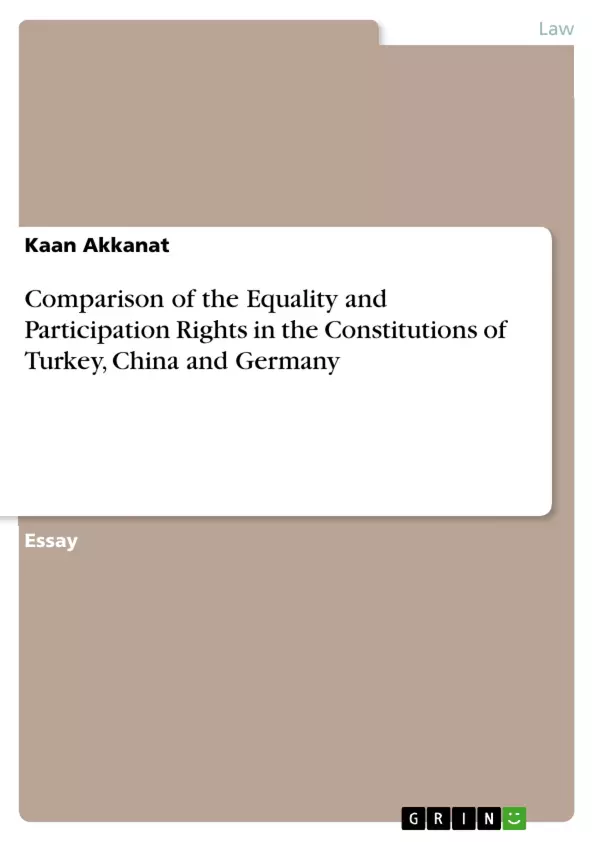This section of our analysis will be devoted to the cross comparison of Turkish, German and Chinese constitutions’ coverage and interpretations of the equality and participation rights. Following the similar methodological line with the “Freedom of Speech and Expression” and “Division of Power” sections, this section will first provide an understanding of where and how these selected countries stand on the parameters of equality and participation rights.
The focus of our discussion will then shift to our trilateral constitutional comparison and how they differ from each other in terms of wording, sequence and the emphasis. The drawn ‘picture’ of equality and participation rights will then be framed by taking advantage of well-known court cases from these countries. After the court-case application phase, the section will consequently exhibit the findings related to the trilateral comparison.
Equality and participation rights are two particular concepts which are applicable to various dimensions of social sciences. Having law as our natural focus, the discussion about the equality will mainly focus on equality before law. In his “Critique of the Gotha Program”, Karl Marx defines this focus with following words; “Equality before the law is a basic right in the constitutions of democratic countries, and its content appears in all conventions on human rights”(Marx, 1875). In terms of equality, the gender and minority equality/inequality will be the main points of concern.
Along with this, the importance of political participation rights will also be stretched throughout the section. As Fabienne Peter suggests, there is a tendency to exclude political participation rights from the minimal lists of human rights as it does not necessarily affect the survival or some basic life functions (Peter, 2013). Peter opposes to this general tendency “I shall argue that the right to political participation, understood as distinct from a right to democracy, should have a place even on minimalist lists” (Peter, 2013). Parallel to Peter’s insistence on necessity of being sharp about the rights for political participation, our section will majorly focus on the defined parliament compositions, voting and candidacy rights andelectoral threshold enforcements.
Inhaltsverzeichnis (Table of Contents)
- Introduction: Comparison of the equality and participation rights in the constitutions of Turkey, China and Germany
- Equality and Participation Rights in Turkey
- Equality in Turkey
- Participation Rights in Turkey
- Equality and Participation Rights in China
- Equality in China
- Participation Rights in China
- Equality and Participation Rights in Germany
- Equality in Germany
- Participation Rights in Germany
- Trilateral Comparison: Wording, Rank & Sequence
- Findings and Conclusion
Zielsetzung und Themenschwerpunkte (Objectives and Key Themes)
This paper aims to compare the equality and participation rights as outlined in the constitutions of Turkey, China, and Germany. It analyzes the constitutional provisions related to these rights, investigates their application in practice, and highlights key differences in their formulation, ranking, and emphasis across these three countries.
- Equality before the law
- Gender equality
- Minority rights
- Political participation rights
- Electoral processes and systems
Zusammenfassung der Kapitel (Chapter Summaries)
- Introduction: This chapter provides an overview of the paper's objectives and methodology, defining key concepts like equality before the law and political participation rights. It also establishes the context for the comparison by outlining the importance of these rights in democratic societies.
- Equality and Participation Rights in Turkey: This chapter explores the constitutional provisions concerning equality and participation in Turkey. It examines the concept of equality before the law, including its application in the context of gender and minority rights. The chapter also discusses the Turkish constitution's provisions regarding political participation, including voting, candidacy, and political party formation.
- Equality and Participation Rights in China: This chapter analyzes the constitutional framework for equality and participation in China. It examines the legal provisions related to equality before the law, gender equality, and minority rights. The chapter also explores China's approach to political participation and its electoral system.
- Equality and Participation Rights in Germany: This chapter delves into the constitutional framework for equality and participation in Germany. It explores the German constitution's provisions concerning equality before the law, including its application in the context of gender and minority rights. The chapter also examines the provisions relating to political participation, including voting, candidacy, and political party formation in Germany.
Schlüsselwörter (Keywords)
This paper focuses on the key concepts of equality and participation rights, exploring their constitutional framing in Turkey, China, and Germany. The analysis examines the legal provisions, practical implementation, and comparative differences between these three countries, including key themes like gender equality, minority rights, and political participation. The study utilizes relevant legal frameworks, international standards, and case studies to provide a comprehensive overview of these fundamental rights.
Frequently Asked Questions
Which countries are compared regarding constitutional rights in this study?
The study provides a trilateral comparison of the constitutions of Turkey, China, and Germany.
What is the focus of the "Equality" section?
The discussion mainly focuses on equality before the law, with specific attention to gender and minority equality.
How are "Participation Rights" analyzed in this paper?
The analysis focuses on political participation, including parliament compositions, voting rights, candidacy, and electoral thresholds.
Does the study include practical legal applications?
Yes, the constitutional comparisons are framed by taking advantage of well-known court cases from each of the three countries.
What methodology is used for the trilateral comparison?
The study compares the wording, sequence, and emphasis of the legal provisions across the different constitutions.
- Quote paper
- Kaan Akkanat (Author), 2014, Comparison of the Equality and Participation Rights in the Constitutions of Turkey, China and Germany, Munich, GRIN Verlag, https://www.grin.com/document/292759



